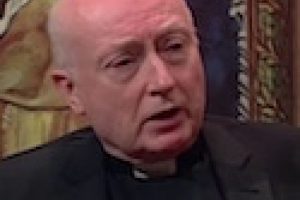Column: From the Pastor
Eyebrows were raised when Queen Victoria commented that of all her predecessors, she would most enjoy a conversation with King Charles II. In the arrangements of their domestic lives they could hardly have been more unlike, but Charles was a man of attractive wit, and that was her point. In most ways, Voltaire was the perfect opposite of Pope Benedict XIV, but he admired the pope’s gifts as an astonishing polymath and even dedicated a stage play to him.
The scientific and literary pursuits of Benedict did not concentrate his mind to the neglect of the ministry of the Church. He revived devotion to the Blessed Virgin as “Mother of the Church” in 1748, in the tradition of Saint Ambrose of Milan, who first used the title in the fourth century. As the Church is the body of Christ born of Mary, Pope Paul VI, previously an archbishop in the Ambrosian succession, formally proclaimed the title at the close of the Second Vatican Council. In 2018, our present Pontiff decreed that the Monday after Pentecost be a Memorial of the Blessed Virgin Mary, Mother of the Church. This year on May 1, the bishops of North America put their churches under the protection of Mary, the Mother of the Church.
Pope Benedict XVI wrote: “The Church . . . carries the burdens of history. She suffers, and she is assumed into heaven. Slowly she learns that Mary is her mirror, that she is a person in Mary. Mary, on the other hand, is not an isolated individual. . . . She is carrying the mystery of the Church.”
In the Clementine Hall of the Vatican is an allegorical painting of a woman nursing symbols of the Four Evangelists. Christians who call themselves Evangelicals might find the depiction startling, but it is a reminder that one cannot be fully a “Bible-believing Christian” without the Church that nurtured the canonical formulation of the Holy Scriptures.
Deprived of the Church’s sacraments during the pandemic, the faithful can find resonance in the old spiritual: “Sometimes I Feel Like a Motherless Child.” The experience is not unique to the present time. In various plagues, churches have had to close. Christians, including missionaries, have also been denied sacramental access due to geographical isolation.
Sometimes the Church herself has imposed “interdicts” banning public worship for disciplinary reasons: Pope Adrian IV briefly placed Rome itself under interdict; by decree of John XXII, churches were shut in Scotland for eleven years; and Innocent III censured France for nearly a year, Norway for four years, and England for six. The circumstances were complicated and regrettable, but the results overcame previous lassitude and bonded the faithful to the Easter joy of the Blessed Mother.
Queen of Heaven, rejoice, alleluia.
For He whom you did merit to bear, alleluia.
Has risen, as He said, alleluia.
Pray for us to God, alleluia.
View Articles Father Rutler was ordained to the diaconate in Rome by His Eminence William Cardinal Baum in 1980 and received priestly ordination in St. Patrick's... MORE »



You must be logged in to post a comment.